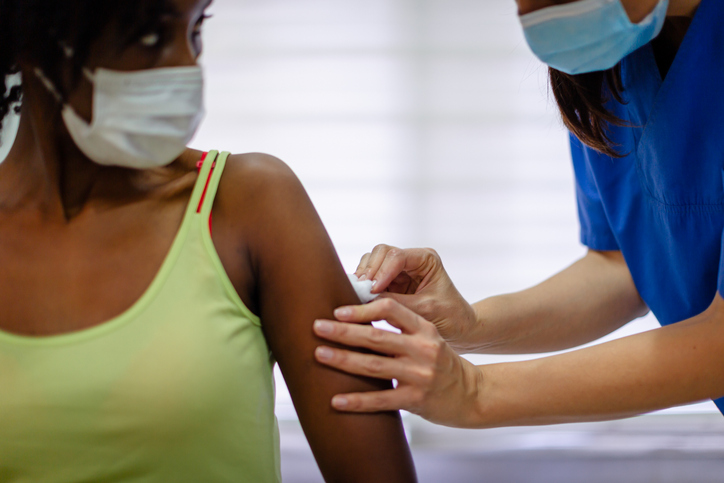
Source: NoSystem images / Getty
As COVID-19 has disproportionately impacted people of color, we’re using National Minority Health Month as an opportunity to have COVID conversations. We’re speaking with experts in the field of health and wellness about how to confront medical bias, concerns over the vaccine, mental health during these troubling times, and more.
—
To get vaccinated or to not get vaccinated?
For some people, it’s a no-brainer. You’ve probably seen them online. They’re your social media friends sharing photos of their vaccination cards. They have videos and colorful captions about how excited they are to be able to do things they haven’t done comfortably since before the pandemic began a year ago and masks took over our lives — and faces.
For others though, it’s a no-no. You’ve likely seen those individuals, too. They are the ones who say they either won’t ever take the vaccine and share a few reasons/conspiracy theories as to why that is, or they state that they want to see how it affects others (many, many others) before they consider it.
And while vaccination rates are increasing as eligibility expands, which is good news, Black and brown people have received it far less than their white counterparts. The reasons behind that are far more complex than just a justified skepticism of the government. For one, the vaccine, for many, simply hasn’t been distributed equitably.
“There are many reasons, but two major factors are the social determinants of health and trust in the system,” says Norma Cuellar, president of the National Association of Hispanic Nurses (NAHN) and a contributor to the National Institutes of Health’s All of Us Research Program, which is seeking to build one of the most diverse health databases this country has seen with the help of one million people. “Lack of access to health care providers, lack of culturally congruent health care, or even language barriers or misunderstandings where people think they must pay for the vaccine can depress vaccination rates.”
In regards to the Latino community, she says that there is a distrust in getting vaccinated due to not only the historical abuses experienced but also “fears of adverse health outcomes, including side effects of the vaccine.”
“For Latinos,” she added, “there is also concern over confidentiality, particularly as it relates to immigration status.”
For the Black community, it too is deeper than what’s been reported.
“The current narrative ‘Why are Black people hesitant to take the vaccine?’ ignores the substantive history of discrimination, oppression, and the mistreatment of African Americans,” says Dr. Gil Singletary, senior director for Chamberlain University’s College of Health Professions. “It also ignores significant disparities in deaths and the mistreatment of African Americans prior to, and during the COVID pandemic. Moreover, such an assertion absolves federal and state governments of inhuman breaches of ethical standards predicated upon false beliefs of advancing science and healthcare.”
He adds, “Historical events such as the Tuskegee Experiment, The North Carolina Eugenics Program, and the exploitation of Henrietta Lacks creates significant apprehension for African Americans regarding basic elements of trust.”
Singletary also notes that the way in which the vaccine has been communicated to all people has played a part in a lack of trust, not only for communities of color, but also the growing “anti-vaxxers” described as white women in the suburbs. People are often more confident in vaccinations that have years’ worth of research time, and the perception of the vaccine has likely been impacted by that, as well as a general aversion to vaccines (and what’s in them), and the name used to accelerate the creation of COVID vaccines under the previous administration.
“Ideally, communications should be clear, concise, and based on science. It is difficult to argue that the initial communication strategy surrounding the vaccine was disjointed and convoluted, at best,” Singletary says. “Starting with the introduction of the vaccine and strategy ‘Operation Warp Speed.’ The name itself gives off the wrong impression regarding the development and integrity of the vaccine. This, coupled with how the vaccine was used as a political football during the 2020 election helped create massive mistrust and apprehension.”
In order for things to be turned around, and there to be a trust of the efforts to get people vaccinated, both experts say better efforts need to be made, especially by government and health officials, to address concerns, educate people, and take accountability.
“We need to forge new community partnerships and work with people that are trusted by their peers,” Cuellar says. “We need to communicate directly with people who are hesitant and educate them on this. For the Latino community, we also need to relay information in Spanish.”
“The first step to establishing trust begins with governmental agencies of all levels acknowledging previous wrongs sanctioned by the government,” Singletary declares. “Secondly, targeted communications that validate the fears of African Americans would prove vital to normalizing current tensions and reduce the stigma that perpetuates mistrust.”
“He adds, “blaming the victim for circumstances in which s/he didn’t create negates progress and delays reconciliation.”
There are people likely to still be against it even after all of that. Wherever you stand though, do your research in order to make the best decision for yourself and your loved ones. Assess the risks and benefits, as it’s not ridiculous to be hesitant whether you are for the shot or against it. All that being said, Singletary is confident that the more we know, the more we will understand the need for the vaccine even if we’re not all rushing to get it.
“Education is important to understanding the origins of the virus and why the vaccine is necessary,” he says. “If more African Americans understood the science behind the vaccine, I am confident that we would see a favorable correlation with respect to education and decrease apprehension.”









